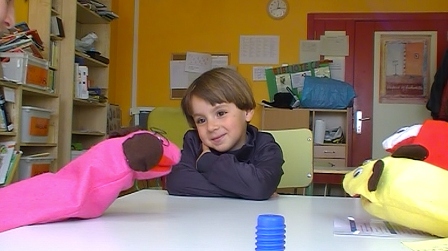Emotional intelligence linked to better social abilities and adaptation in childhood
According to a study by the UPV/EHU-University of the Basque Country, EI is also related to minor attention problems and aggressive behaviour in children
First publication date: 01/12/2014

The concept of emotional intelligence is relatively recent -it began to be used in the 1990s- but the research carried out shows a clear link between it and better emotional abilities, better perception of one's own well-being, better relationships with one's friends as well as partner, and greater professional performance, above all in spheres relating to the "human factor": team management, education, etc.
The PhD thesis entitled Inteligencia emocional en niños y niñas entre 3 y 6 años, evaluación y relaciones con la inteligencia emocional de sus madres (Emotional intelligence in 3 to 6-year olds, evaluation and how this relates to the emotional intelligence of their mothers) (Natalia Alonso, UPV/EHU-University of the Basque Country) has studied how emotional abilities in childhood emerge and develop and how they influence behaviour and psychosocial adjustment during that stage; it pays particular attention to the three-to-six age bracket, which is when some of the basic aspects for the development of future emotional intelligence are established. Among the conclusions of the work, the following stands out: children with greater emotional abilities have fewer attention and shyness problems and lower rates of aggressive behaviour.
"Emotional intelligence is no panacea despite the many benefits it brings. There are people who hope that if their EI improves, this will solve their life issues, but it doesn't work like that: knowing how to manage our anger doesn't mean we are going to stop getting angry when someone treats us badly or takes our parking space," says Natalia Alonso, the author of the study. "In any case," she went on, "if we manage and understand our feelings better, we will react better, so we will feel that we have control over our behaviour and we will be more satisfied with our behaviour and with our relationships with other people."
Six basic emotions
But what is emotional intelligence? "The set of abilities to process the information coming from the emotions, including adequately perceiving, expressing, understanding and regulating the emotions in the self and in others," according to the definition of Salovey and Mayer (1997). These abilities are implemented with all kinds of emotions, but in the age bracket tackled by this study, they refer in particular to basic or universal ones "There is no absolute consensus on the number of emotions, but most authors agree that there are six basic or universal ones: happiness, sadness, anger, disgust, surprise and fear. And there are authors like Izard who add a seventh emotion to these six: interest, understood as curiosity or eagerness to search," as the author of the study pointed out.
"We are also doing a comparison between cultures," said Alonso. "Emotions are universal and the abilities we have mentioned are innate; but not all cultures experience emotions in the same way. For example, expressing anger is better accepted here than in other cultures, and the fact that the emotion is accepted provides the basis for managing anger. That is why we want to know whether emotional abilities are developed equally in different cultures in this phase of life (between the ages of three and six)."
Two measuring tools have been used for evaluating the perception, expression and understanding of emotions(the Emotion Matching Task, EMT) and the regulation of them (Puppet Procedure). As far as the possible practical applications of the study are concerned, Alonso highlights the following: "The results may contribute towards helping and encouraging children to develop their abilities to perceive their own emotions and those of others better, understand them and acquire new tools or strategies to regulate them, which, in the end, will benefit their own well-being and better relations with themselves and everyone else."
She pointed out, finally, that "the relationship between children's emotional abilities and their behaviour forms the basis for detecting whether these abilities in the early years of life are related to their conduct in later life as well, in other words, whether they are 'predictors' of future behaviours and, if so, that would constitute an endorsement to encourage this effort to help children to strengthen this kind of intelligence right from the early years of life in view of its importance at later stages".
Additional information
Natalia Alonso has a degree in Pedagogy and Psychopedagogy and a Master's degree in Psychological Research. She works as a researcher and educator in emotional intelligence. Her thesis, Inteligencia emocional en niños y niñas entre 3 y 6 años, evaluación y relaciones con la inteligencia emocional de sus madres (Emotional intelligence in 3 to 6-year olds, evaluation and how this relates to the emotional intelligence of their mothers), was written up under the supervision of Ana I. Vergara-Iraeta, tenured lecturer in the UPV/EHU's Department of Social Psychology and Methodology of Behavioural Sciences and dean of the Faculty of Psychology, and Pablo Fernández-Berrocal, professor of the University of Malaga.
The data gathering for writing up the work was done in Madrid, while the planning and design of the thesis and the data processing were done in Donostia-San Sebastian in collaboration with Carroll E. Izard, of the Human Emotions Laboratory (University of Delaware).
Bibliography
Besides writing up the above-mentioned thesis, Natalia Alonso has made various presentations at international conferences and is a co-author of the article "The Adaptation and Validation of the Emotion Matching Task for Preschool Children in Spain" -Alonso-Alberca, N., Vergara, A., Fernández-Berrocal, P., Johnson, S. & Izard, C. (2012)-, published in the International Journal of Behavioral Development, 36(6), 489-594. Journal IF: 1.591.







